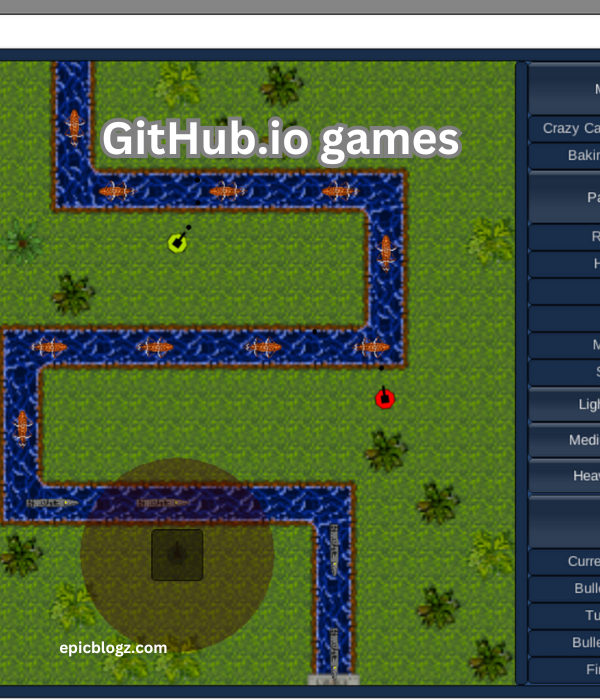Introduction to GitHub.io Games
GitHub.io is a platform that allows developers to host their projects using GitHub Pages. This feature makes it easy to publish web-based games, enabling developers to share their creations with a global audience. The games hosted on github.io range from simple HTML5 projects to complex multiplayer experiences, showcasing the versatility of web technologies.
Why GitHub.io for Game Development?
- Accessibility: GitHub.io games are accessible to anyone with a web browser, eliminating the need for downloads or installations.
- Open Source Collaboration: Developers can collaborate on projects, learn from each other, and contribute to open-source games.
- Cost-Effective: Hosting games on GitHub Pages is free, making it an ideal choice for indie developers and hobbyists.
Getting Started with GitHub.io Games
Before diving into the best games available, it’s essential to understand how to get started with github.io games.
Setting Up Your GitHub Account
- Create a GitHub Account: If you don’t already have one, sign up for a free GitHub account.
- Create a New Repository: Once logged in, create a new repository for your game project.
- Enable GitHub Pages: In the repository settings, enable GitHub Pages to host your game.
Building Your First Game
To create a game on github.io, you can use HTML, CSS, and JavaScript. Here’s a simple outline to get you started:
- Choose a Game Concept: Decide on the type of game you want to create (e.g., platformer, puzzle, or arcade).
- Develop the Game Logic: Write the necessary JavaScript code to implement the game mechanics.
- Design the User Interface: Use HTML and CSS to create an engaging user interface.
- Test Your Game: Run your game in a web browser to ensure everything works as intended.
- Publish Your Game: Push your code to GitHub, and your game will be live on your github.io page.
Top GitHub.io Games for Developers
Now that you know how to get started, let’s explore some of the best github.io games that can inspire and educate developers.
1. 2048
Repository: 2048 GitHub Repository, 2048 is a classic sliding puzzle game that challenges players to combine numbered tiles to reach the elusive 2048 tile. This game is an excellent example of how simple mechanics can lead to addictive gameplay.
- Technologies Used: HTML, CSS, JavaScript
- Learning Points: Understanding game logic, handling user input, and implementing animations.
2. Flappy Bird Clone
Repository: Flappy Bird Clone GitHub Repository, This project is a clone of the popular mobile game Flappy Bird. Players navigate a bird through a series of pipes by tapping the screen to make the bird flap its wings.
- Technologies Used: HTML5 Canvas, JavaScript
- Learning Points: Working with the HTML5 canvas, collision detection, and game physics.
3. Pac-Man
Repository: Pac-Man GitHub Repository, This implementation of the iconic Pac-Man game allows players to navigate a maze, eat pellets, and avoid ghosts. It’s a fantastic project for understanding classic game design.
- Technologies Used: HTML, CSS, JavaScript
- Learning Points: Game state management, AI for ghost movement, and maze design.
4. Tetris
Repository: Tetris GitHub Repository, Tetris is a timeless puzzle game where players rotate and place falling blocks to create complete lines. This version is built using JavaScript and showcases the fundamentals of game mechanics.
- Technologies Used: HTML, CSS, JavaScript
- Learning Points: Implementing game loops, managing game states, and handling user input.
5. Snake Game
Repository: Snake Game GitHub Repository, The Snake Game is a classic arcade game where players control a snake to eat food and grow longer while avoiding collisions with walls and itself. This project is great for beginners.
- Technologies Used: HTML, CSS, JavaScript
- Learning Points: Understanding game loops, collision detection, and score tracking.
6. Memory Game
Repository: Memory Game GitHub Repository, This memory matching game challenges players to find pairs of matching cards. It’s a fun way to learn about state management and event handling.
- Technologies Used: HTML, CSS, JavaScript
- Learning Points: Managing game state, handling user interactions, and implementing timers.
7. Platformer Game
Repository: Platformer Game GitHub Repository, This platformer game allows players to jump across platforms, collect items, and avoid enemies. It’s an excellent project for those looking to dive into more complex game mechanics.
- Technologies Used: HTML5 Canvas, JavaScript
- Learning Points: Physics in games, character movement, and level design.
8. Asteroids
Repository: Asteroids GitHub Repository, Inspired by the classic arcade game, this project allows players to control a spaceship and destroy asteroids while avoiding collisions. It’s a great way to learn about space physics and collision detection.
- Technologies Used: HTML5 Canvas, JavaScript
- Learning Points: Implementing game physics, handling user input, and creating a scoring system.
9. Space Invaders
Repository: Space Invaders GitHub Repository, This version of Space Invaders challenges players to shoot down waves of aliens while avoiding their attacks. It’s a fun project that introduces concepts of enemy AI and shooting mechanics.
- Technologies Used: HTML, CSS, JavaScript
- Learning Points: Creating enemy patterns, managing game states, and implementing shooting mechanics.
10. Chess Game
Repository: Chess Game GitHub Repository, This chess game allows players to engage in strategic gameplay against an AI opponent or another player. It’s a great project for understanding complex game rules and logic.
- Technologies Used: HTML, CSS, JavaScript
- Learning Points: Implementing game rules, managing game states, and creating a user-friendly interface.
Benefits of Developing Games on GitHub.io
Creating games on GitHub.io offers several advantages for developers:
1. Hands-On Learning Experience
Developing games provides a practical way to apply programming concepts and improve coding skills. By building and debugging a game, developers gain valuable experience that can be applied to other projects.
2. Portfolio Development
Hosting games on GitHub.io allows developers to showcase their work to potential employers or collaborators. A well-crafted game can serve as an impressive addition to a developer’s portfolio.
3. Community Engagement
GitHub.io fosters a sense of community among developers. By sharing games and collaborating on projects, developers can learn from each other and contribute to the open-source ecosystem.
4. Experimentation and Innovation
The flexibility of web technologies allows developers to experiment with new ideas and mechanics. GitHub.io provides a platform for testing innovative concepts without the constraints of traditional game development.
5. Immediate Feedback
Publishing games on GitHub.io allows developers to receive immediate feedback from players. This feedback can be invaluable for improving gameplay, fixing bugs, and enhancing user experience.
Conclusion
GitHub.io games represent a vibrant and innovative space for developers to create, share, and play. With a plethora of projects available, developers can find inspiration, learn new skills, and engage with a supportive community. Whether you’re a beginner looking to build your first game or an experienced developer seeking to refine your skills, the world of GitHub.io games offers endless possibilities. Dive into these projects, unleash your creativity, and master the art of game development!
FAQs
What is GitHub.io?
GitHub.io is a platform that allows developers to host their web projects using GitHub Pages, making it easy to share and access games directly from a web browser.
How do I create a game on GitHub.io?
To create a game on GitHub.io, you need to set up a GitHub account, create a repository, enable GitHub Pages, and develop your game using HTML, CSS, and JavaScript.
Are the games on GitHub.io free to play?
Yes, most games hosted on GitHub.io are free to play, as they are often developed as open-source projects by independent developers.
Can I contribute to existing GitHub.io games?
Absolutely! Many GitHub.io games are open-source, allowing you to contribute by submitting issues, pull requests, or collaborating with the original developers.
What technologies are commonly used in GitHub.io games?
GitHub.io games typically utilize HTML, CSS, and JavaScript, along with libraries and frameworks like Phaser, Three.js, and p5.js for enhanced functionality and graphics.







